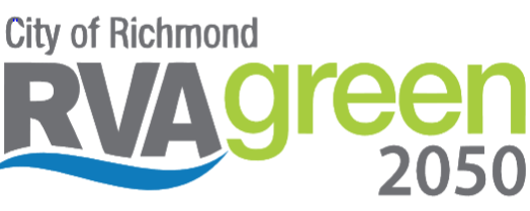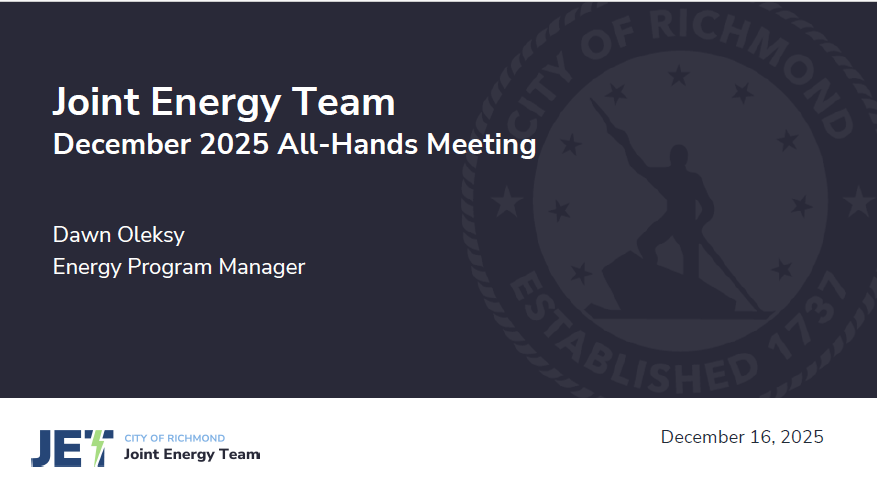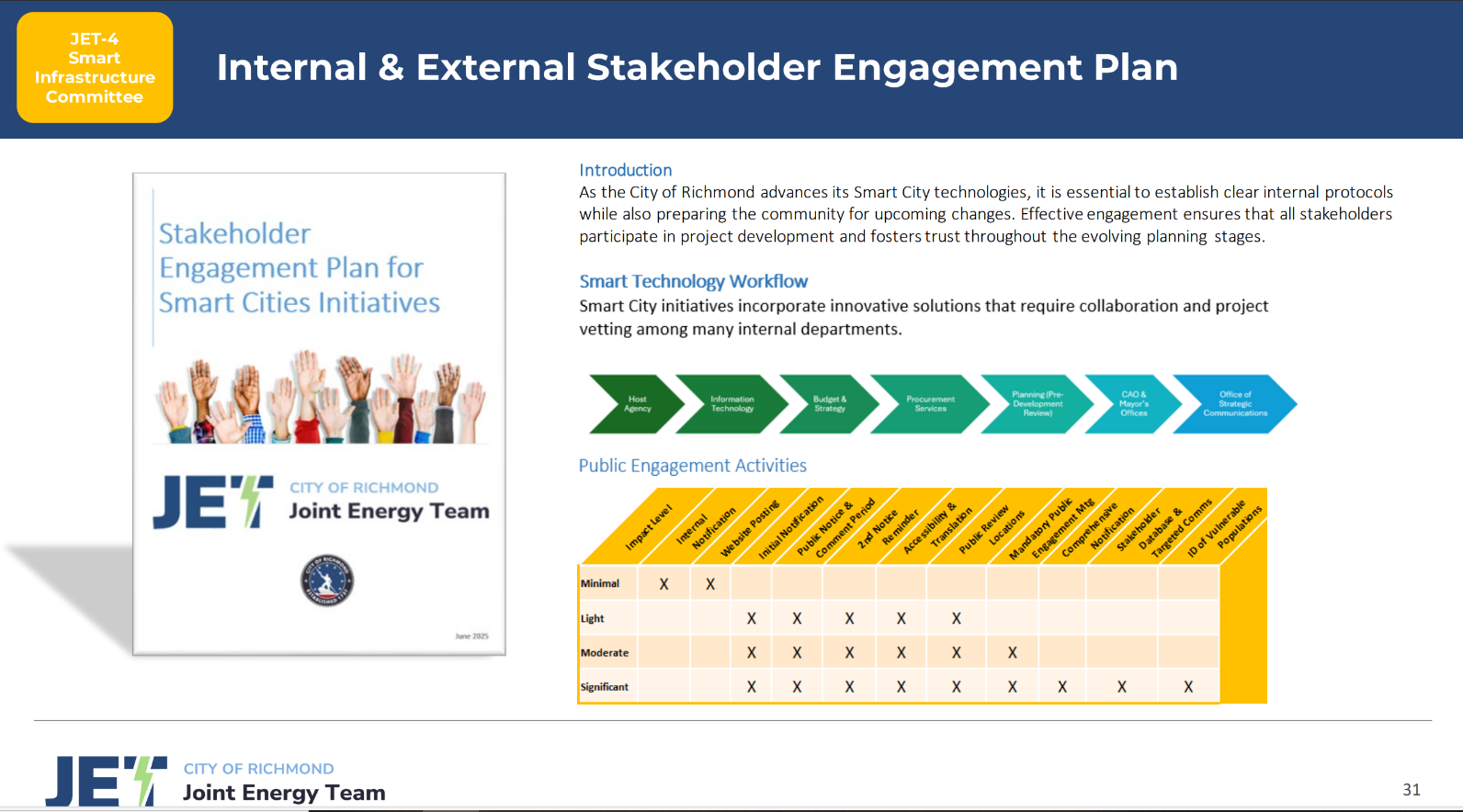JET PROJECTS
The Joint Energy Team (“JET”) was established in 2023 to ensure that all City departments share in the responsibility of improving energy efficiency, reducing carbon emissions, and partnering in strategic planning for all related initiatives. The JET aligns with the Mayor’s mission to provide trustworthy leadership and high-quality services that meet the needs of our vibrant city.
JET Meetings:
To learn more about current JET initiatives check out the updates from the December All-Hands meeting.
If you are interested in learning more about JET or any of these projects, please visit www.rvagreen2050.com/jet or email us at info.jet@rva.gov
JET Committees:
The JET brings together City staff into five committees to support the City’s transition to our clean energy future. Learn more about the JET’s five collaborative committees below.
Municipal Energy Assessments Committee
The City of Richmond is committed to lowering GHG emissions and billing costs in City-owned buildings. By adopting a benchmarking plan, the building and energy managers can prioritize the buildings that need the most TLC. The Municipal Energy Assessments Committee is also focused on applying naming conventions across all computerized maintenance management systems (CMMS) and migrating those units under one centralized system. This committee is proud to share it’s commitment to DOEs Better Climate Challenge by reducing municipal GHG emissions across out portfolio in 10 years.
Resources
Energy Conservation & Education Committee
Energy Management Policy
The purpose of the Energy Management Policy for Municipal Operations is to reduce the consumption of energy in the City of Richmond and increase renewable energy sources, thereby reducing operating costs, improving energy resilience, mitigating climate impacts, reducing the city’s vulnerability to climate change, and fostering a city culture that values environmental, social and economic sustainability as supported by the city’s Office of Sustainability (OOS).
The Energy Conservation & Education Committee has created a FAQ sheet for employees and Employee Expectations guide for directors and supervisors to help City staff with this transition. These documents ensure all employees can help lower the City’s municipal emissions one building at a time.
The Energy Conservation & Education Committee is committed to communicating the importance of energy efficiency and conservation to all city employees. With the creation of the new Energy Management Policy for municipal operations, the city is making strides to address conservation concerns. To learn more about the new administrative regulation see the full breakdown on our Energy Policy page.
The Energy Conservation & Education Committee distributes a quarterly Energy Bulletin for employees to stay updated on JET projects, energy conservation initiatives, and steps to reduce our municipal carbon emissions footprint. By sharing information on solar projects, EV fleet transitions, and energy saving tips, the committee is keeping the city up to date on all things ENERGY!
Past Bulletins
Jet Branding
With the help of OSC we created a JET logo for all presentations and swag. Now, the city and community will know when something is coming from a JET objective.
Resources
Energy Awareness Bulletin
Electric Vehicle Transition Committee
The city has begun transitioning its fleet to reach its goal of being fully electrified by 2050. With a total of 72 vehicles comprised of EV’s and Hybrids. By adding five new EV Charging Contracts, an installation SOP and a new fleet EV Policy the city looks forward to expanding our electrification efforts.
Smart Infrastructure Committee
Outdoor Lighting LED Retrofit
The city has been working diligently through the years to transition its streetlights to newer lighting technology with the use of LEDs, with a projected 50 percent power savings in each year of operations. This project creates safer and better lit streets for the public while lowering the demand on the grid. Progress on this project is as follows:
General Services facilities soon to be 100 percent complete
Parking is prioritizing deck improvements
Parks and Rec will replace upon failure
DPU needs to prioritize water plant retrofits
Stakeholder Engagement Plan
The Stakeholder Engagement Plan serves as a comprehensive guide for engaging internal and external stakeholders in Smart Cities Initiatives within the City of Richmond. Smart Cities Initiatives offer innovative solutions to urban challenges, enhancing resilience, sustainability, and economic prosperity. These measures leverage technology to improve urban services, strengthen the local economy, and elevate the quality of life for residents. Collaboration among stakeholders within the smart city ecosystem allows cities to learn from experiences, share knowledge, and discover effective solutions to common challenges.
Resources
The Smart Infrastructure Committee is focused on the City’s outdoor lighting LED retrofit plan, Smart Cities technologies, and developing public outreach & engagement resources for smart infrastructure projects.
Renewable Energy Planning Committee
Solar Feasibility Study
A solar feasibility study is a comprehensive technical and financial analysis to determine the viability of a solar energy system for a specific location, property, or project. Out of 80 properties considered for the City of Richmond’s solar feasibility study, 25 buildings were found to be eligible. Using criteria such as data collection, facilities assessments, solar exposure, age of roof and many more.
Animal Care and Control
Belmont Library
DPW Operations
East End Social Service Center
Emergency Communications Center
Fire Station 10
Fire Station 23
Fire Station 8
Fleet Garage
Hickory Hill Community Center
Juvenile Courthouse
Juvenile Detention Center
Main Library
Main Street Station Building
Midtown Green
Through the implementation of strategic and innovative long-term measures such as transportation improvements, corporate sustainability goals, building energy efficiency upgrades, energy service delivery improvements, an increase in renewable energy, and advances in waste management, Richmond’s citywide GHG emissions have maintained a downward trend to date in line with its long-term goals. In order to stay on course to these goals the city is working on multiple projects to move us in the right direction.
Additional Solar Projects
Solar Meadow (East End Landfill)
Southside Community Center (solar ready)
Police Precinct #1-LEED Gold eligible and solar ready
Questions about JET? Email info.jet@rva.gov
Police Precinct 4
Public Utilities Operations Center and Warehouses
Sign and Signal Stop
Southside Community Center
Virginia Street Garage
West End Library
Commitment toward 100% Renewable Electricity
Projects in Development
TB Smith Community Center Solar Array
VA Localities Aggregated Virtual Power Purchase Agreement
Solar Feasibility Study
Wastewater Treatment Plant Biogas to Energy Study
The Renewable Energy Planning Committee focuses on the acceleration to a clean energy future by guiding the development and implementation of renewable energy resources and sustainable planning strategies










